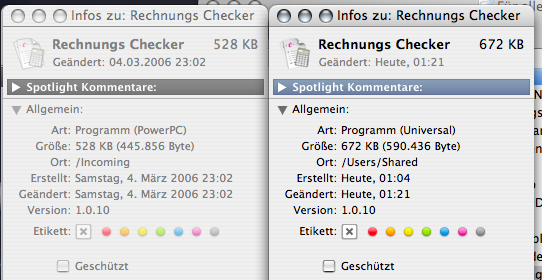236 words
on
earthlingsoft
We were told that turning our standard Cocoa applications into ‘Universal’ – the new term for ‘fat binary’ or multi-processor – ones by merely clicking some check boxes in XCode and recompiling. And that sounded reasonable as all the changes that should be required for a harmless application should be on a level much lower than what is done in the code.
So I checked that checkbox and changed that menu selection and guess what: they were right. A universal binary was mine. And a first test (in a very unscientific sense of the word as in ‘select each menu item once’) on a friend’s new iMac suggests that it works just fine on the other processor. Pretty much like I expected.

But should this be released? It’ll always be a major hassle for me to check things on the Intel side should the need arise. The download will be larger and the speed increase will be so trivial in this case that I doubt people can notice it. And there’s one more technical hurdle in the way: I’m not sure whether the changes I made to the project to compile the universal binary mean that it won’t run on X.2 and X.3 anymore. And I don’t have a computer for testing that on.
Oh, and that ‘Universal’ logo seems so loftily silly to me that I don’t really want to see it next to my application…
April 27, 2006, 0:29
Tagged as
earthlingsoft.
Seriously? I really like the Universal logo! It’s application zen for a harmonious existence on either PowerPC or Intel chips! :-)
April 27, 2006, 14:24
I don’t think the logo fits the subject. It’s just two binaries which are glued together. There’s no harmony or interaction. (And what will be done if a third architecture is added?) I think the old-school ‘fat binary’ terminology was much more appropriate.
April 28, 2006, 11:19
I was surprised that the size of the file didn’t increase more than it did.
I wonder how many years this will last? How long before developers just compile for Intel and PowerPC is dead?
April 28, 2006, 16:57
RechnungsChecker isn’t all that complex and - as with most applications, non-code resources like localisations or readmes make most of the size.
The executable’s size rose from 132KB to 276KB, so everything’s pretty much as you’d have expected.
I hope that the PowerPC is going to live on for long. Expensive computers with PowerPC are still being sold and they seem to be good machines which are strong enough for their job for many years. On the other hand, particularly for non-professional developers, this two-platform situation is a complete mess. And I really hope that Apple’s work in the OS is good enough to keep this painless.
April 28, 2006, 17:59

